New Jersey Teaching Workforce Still Diverse, Inclusive
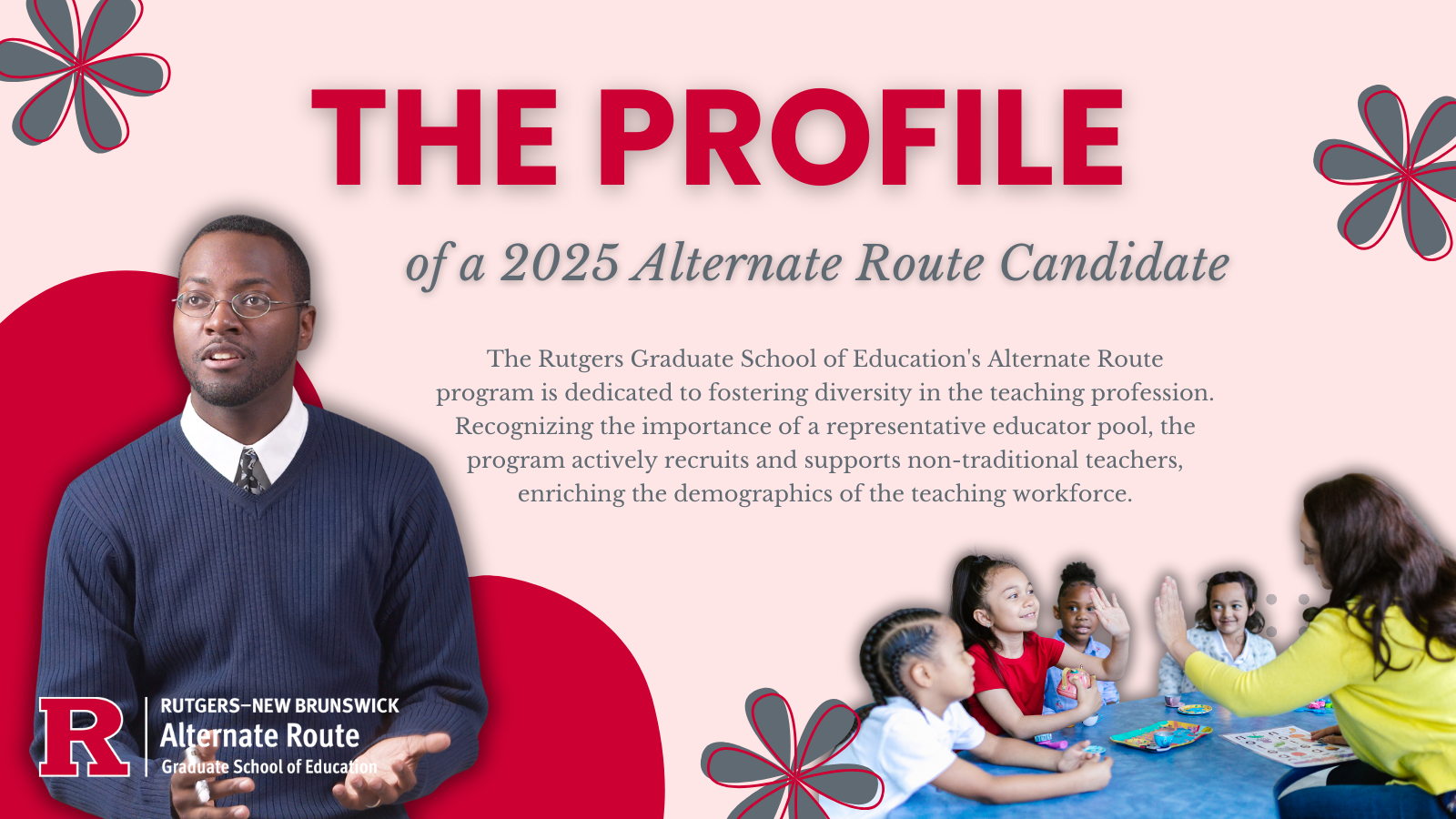
The education profession knows no boundaries. At Rutgers Alternate Route, we firmly believe that anyone with the dedication and drive to teach deserves the opportunity to do so, regardless of their path to the classroom. Whether a recent graduate, a mid-career professional, or someone pursuing a new passion after retirement, every individual brings unique strengths that contribute to a more inclusive and impactful learning experience for students. Our program also reflects this belief by training diverse teacher candidates from a wide range of backgrounds, experiences, ages, and identities. This diversity enriches our learning community and better equips our teacher candidates to meet the varied needs of students and communities across New Jersey.
Each year, we collect and analyze data on all candidates in our program. Our findings highlight a teaching profession that is becoming increasingly representative, from age and gender to race and subject area specialization. As we move forward, this data will continue to shape our efforts to cultivate empowered educators ready to inspire the next generation of teachers. Keep reading to explore the diverse backgrounds and experiences that shape our program.
Ethnic representation in the teaching staff
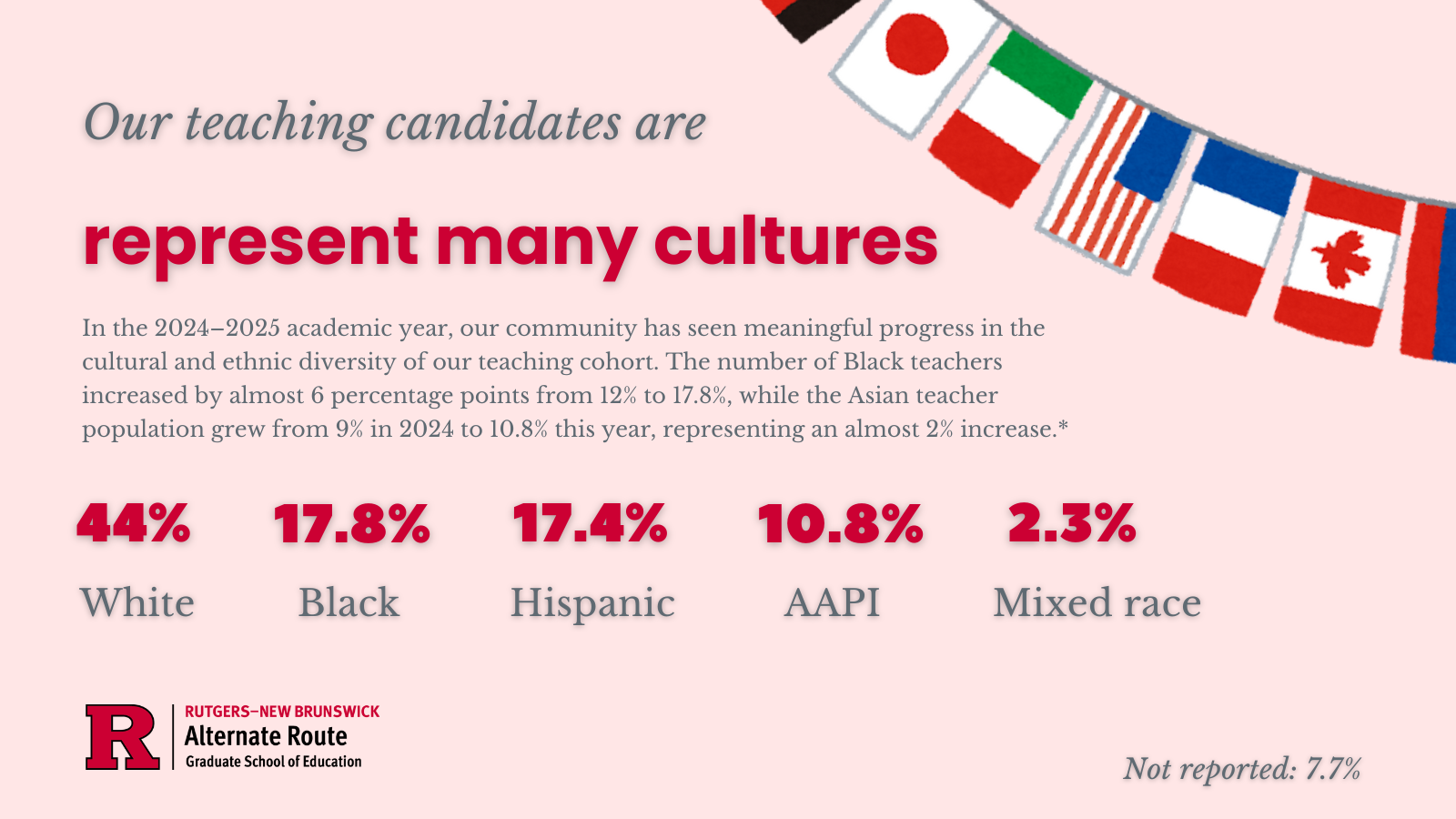
In the 2024–2025 academic year, our community has seen meaningful progress in the cultural and ethnic diversity of our teaching cohort. The number of Black teachers increased by almost 6 percentage points from 12% to 17.8%, while the Asian teacher population grew from 9% in 2024 to 10.8% this year, representing an almost 2% increase. White teachers currently represent 44% of the cohort, and Hispanic teachers make up 17.4%. Additionally, individuals of mixed race are 2.3% of our teacher candidate pool. Together, these varied backgrounds enhance the learning experience for all students.
Education should be inspiring, and its impact deepens when students see themselves reflected in their teachers. We take pride in our cohort’s commitment to motivating and shaping young minds, knowing that representation matters. Research shows that students of color who have teachers from similar backgrounds often achieve more academically, are more likely to graduate, and benefit from stronger social-emotional development. Seeing continued growth among underrepresented ethnic groups in teaching reflects progress, hopefully leading to greater balance and true representation across the profession.
Multigenerational Teaching Workforce Strengthening the Classroom
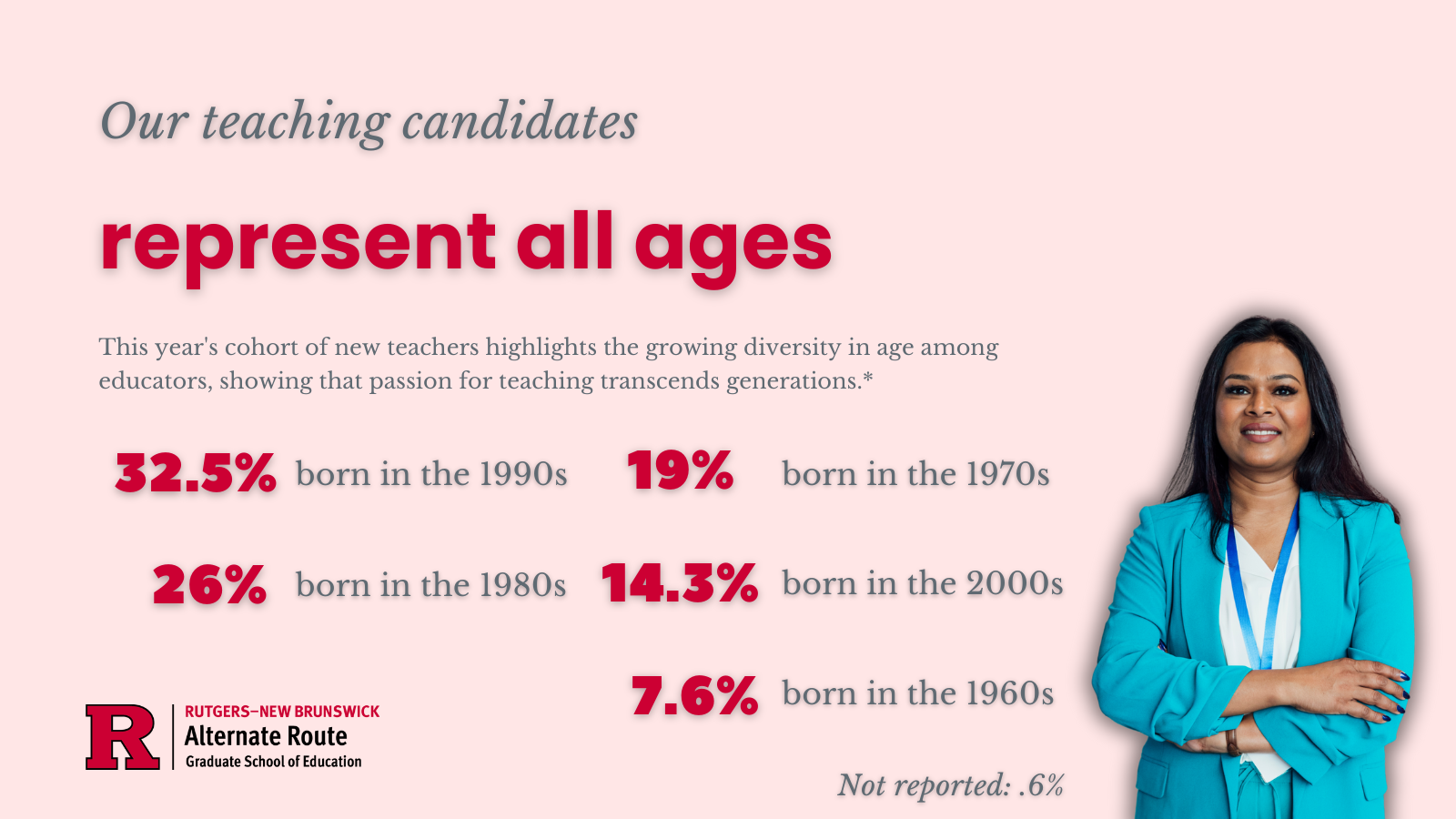
This year's cohort of new teachers highlights the growing diversity in age among educators, showing that passion for teaching transcends generations. The demographic data reveal that a significant portion of new teachers come from various age groups: 32.5% are from the 1990s, 26.0% from the 1980s, and 14.3% from the 2000s. Interestingly, even those born in the 1970s (19.0%) and 1960s (7.6%) are well-represented, underscoring that age is no barrier to entering the profession.
This diverse range of educators brings a valuable balance of experience and innovation to the classroom. While seasoned teachers offer depth and perspective, newer educators bring fresh, modern pedagogical techniques. Together, their collective impact is amplified. Teaching is like a lifelong apprenticeship, and having experienced mentors alongside new recruits strengthens the profession. It's a continuous exchange of best practices, where knowledge and expertise are passed down through collaboration. However, when considering which age group has the greatest impact on students, it becomes clear that the most significant influence comes from qualities like social skills, attitude, and resilience—traits that transcend age. We are grateful for the diverse backgrounds within our cohort and remain committed to fostering a more balanced and inclusive profession.
Gender Balance Pivotal in STEM Education
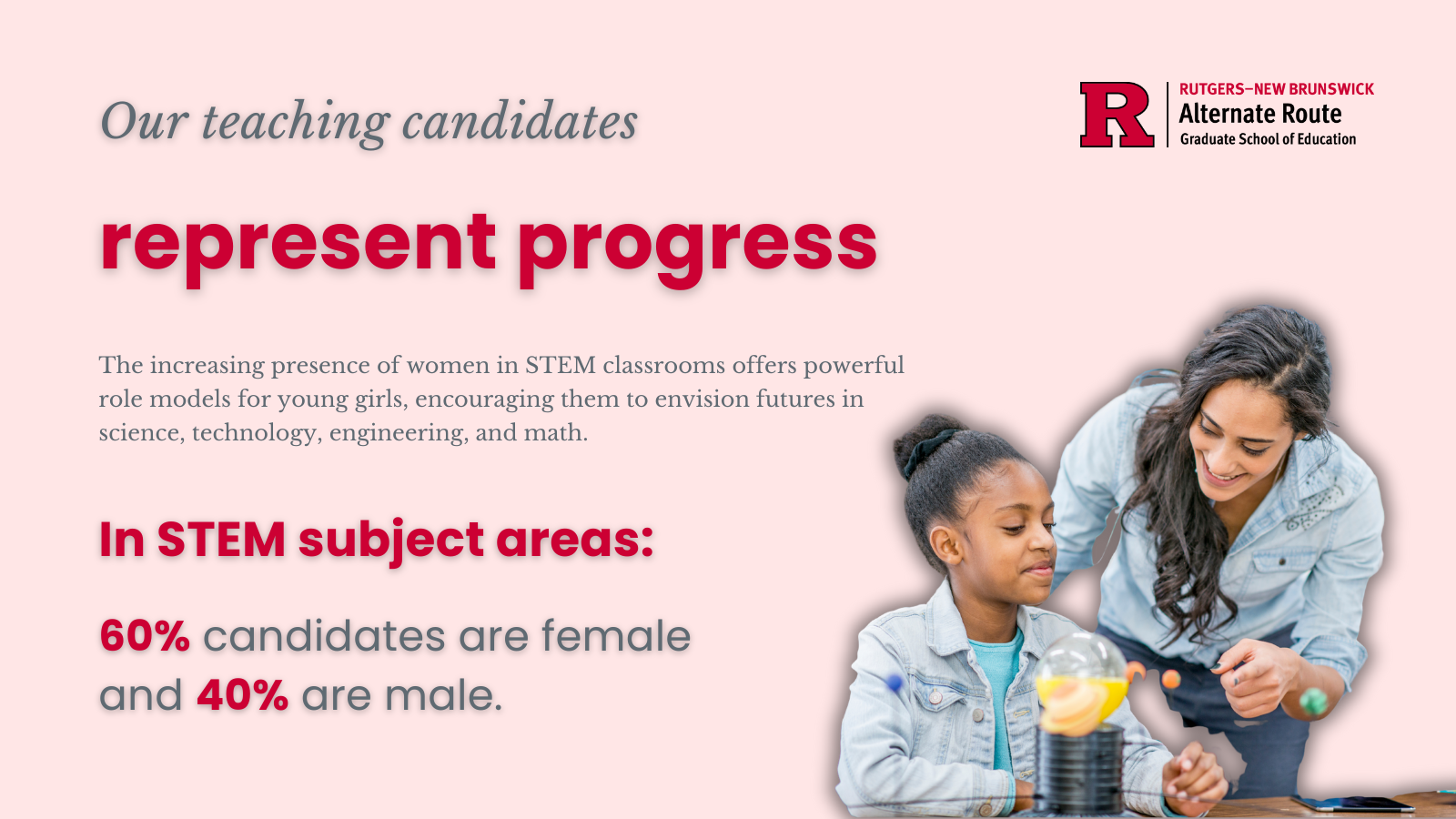
In STEM subject areas, our candidate pool includes 60% female teachers and 40% male, reflecting promising progress toward greater gender representation. The increasing presence of women in STEM classrooms offers powerful role models for young girls, encouraging them to envision futures in science, technology, engineering, and math. The story of physicist Shirley Ann Jackson is just one example. Now President of Rensselaer Polytechnic Institute and the first African-American woman to earn a doctorate from MIT, Jackson credits her teacher, Mrs. Smith, for inspiring her journey. Just one more woman in a STEM classroom can lead to one more woman in a chemistry lab, engineering firm, or operating room. Research supports this impact: female students often show increased self-confidence and improved test performance when taught by female STEM teachers.
Gender Distribution in Elementary Teachers
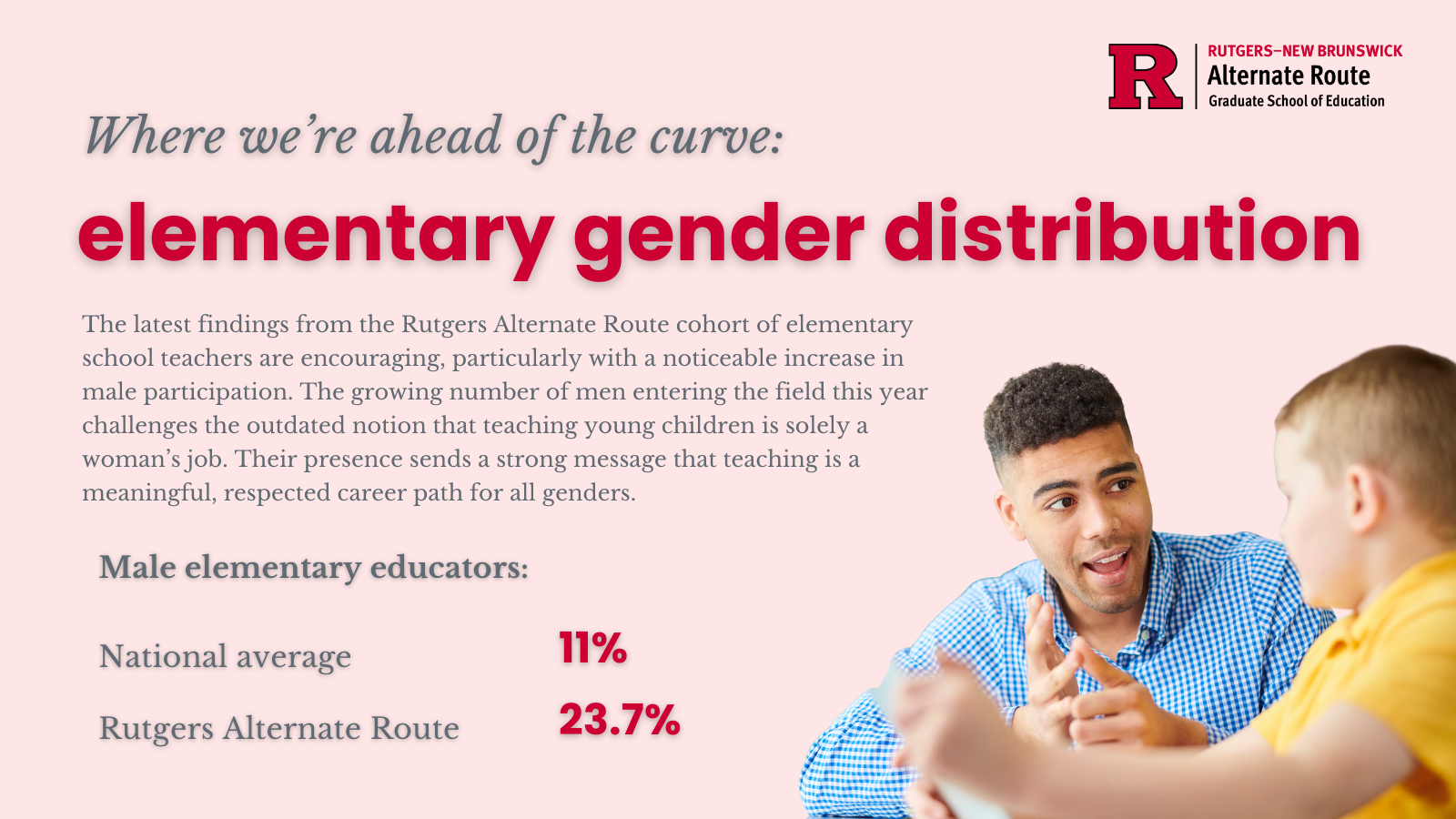
The latest findings from the Rutgers Alternate Route cohort of elementary school teachers are encouraging, particularly with a noticeable increase in male participation. This year, 23.7% of the cohort—41 out of 173 elementary school teachers—are male, similar to last year’s cohort percentage. Nationally, men represent just 11% of elementary school teachers across public and private schools; so our program's numbers are higher than the national average. Nevertheless, gender imbalance remains evident within the cohort—with 128 female teachers, and the upward trend in male representation reflects meaningful progress toward greater gender diversity in the profession.
These results align with longstanding trends in education, where women have traditionally outnumbered men in elementary teaching roles. However, the growing number of men entering the field this year challenges the outdated notion that teaching young children is solely a woman’s job. Their presence sends a strong message that teaching is a meaningful, respected career path for all genders.
District Diversity: Alternate Route around New Jersey
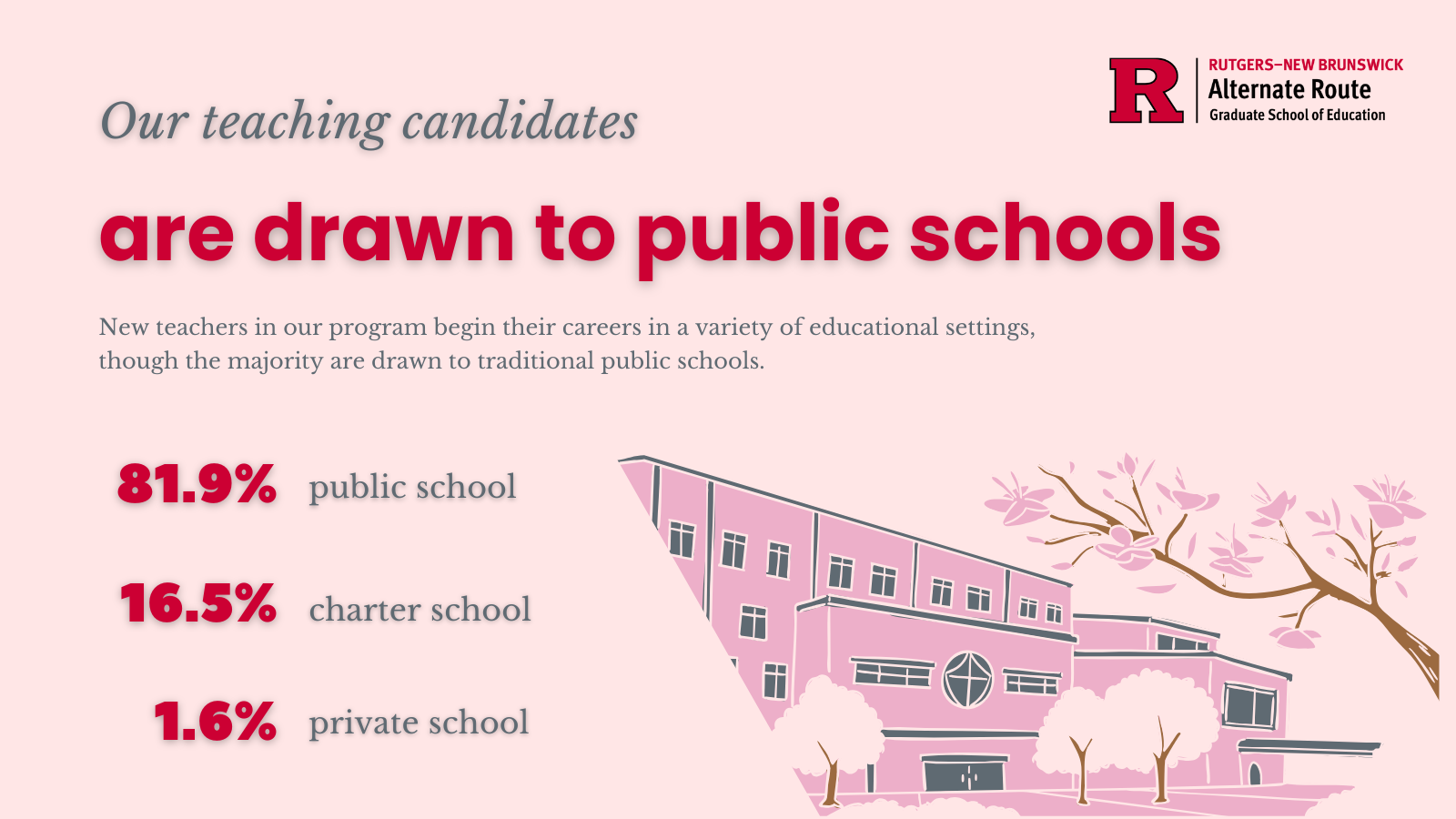
New teachers in our program begin their careers in a variety of educational settings, though the majority are drawn to traditional public schools. Our data shows that district schools remain the top destination, with 81.9% of the cohort choosing to work in these environments. We saw steady numbers this year in new charter school educators—16.5%—indicating ongoing interest in alternative education models. Private schools account for 1.6% of new teacher placements, which may reflect both a limited number of available positions and the specialized nature of these institutions. These trends highlight the diverse preferences and opportunities shaping the early careers of new teachers in our program.
The data also reveals that a slightly higher percentage of new teachers are working in suburban school districts (54.5%) compared to urban districts (45.5%). This challenges the common perception that alternate route teachers primarily serve in large urban areas and underscores the program’s statewide reach.
Overall, the Rutgers Alternate Route program is making intentional strides toward diversifying the teaching workforce. By attracting educators of varying backgrounds, ages, and life experiences, the program is fostering a more inclusive and representative classroom experience for students. This diverse cohort of new teachers is well-positioned to bring fresh ideas and innovative teaching strategies to schools across both urban and suburban communities throughout New Jersey.
If you’re considering following your dream of teaching, Rutgers Alternate Route can offer you the support and training you need to succeed. Be sure to follow Rutgers Alternate Route on Twitter and sign up for Alternate Route’s monthly newsletter for more information and stories from the field of education.

 Heather Ngoma has over 25 years of experience collaborating with educators across New Jersey to drive education innovation. She currently serves as the Director of the Rutgers-GSE Alternate Route Program in the Department of Learning and Teaching, a program which helps career changers, recent college graduates, and other aspiring education professionals become licensed teachers in New Jersey. Follow her on Twitter @heatherngoma.
Heather Ngoma has over 25 years of experience collaborating with educators across New Jersey to drive education innovation. She currently serves as the Director of the Rutgers-GSE Alternate Route Program in the Department of Learning and Teaching, a program which helps career changers, recent college graduates, and other aspiring education professionals become licensed teachers in New Jersey. Follow her on Twitter @heatherngoma.





